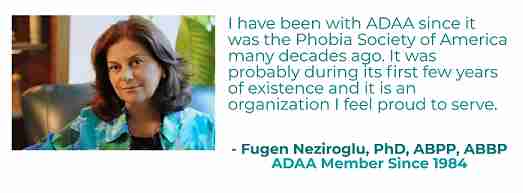A Look Back and Ahead

July 2020
With the world in quarantine this spring due to the coronavirus pandemic, ADAA is particularly proud to be celebrating 40 years of providing a professional home for our multidisciplinary membership and working collaboratively to help the millions of people who struggle every day with anxiety disorders and/or depression find help and hope. During this difficult time, we stand strong and committed to continuing to provide - through collaborative projects with our committed professional membership - free cutting edge evidence-based treatment and research information to the global public community.
Here is a look back at 40 years of innovation, scientific achievement, awareness raising and partnership, and a look ahead to a continued promised to triumph over anxiety disorders and depression.
Today we recognize anxiety disorders as the most common mental health disorders and among the most treatable. It is easy to forget how far our views have come since the first phobia meeting was held in 1978 in White Plains, New York.
The term "anxiety disorder" had not yet been coined. Most anxiety disorders were called phobias. The clinicians and patients who attended the early phobia meetings discussed the need for a national organization to promote awareness of treatments for phobias. The new treatments, so-called contextual or exposure therapies, seemed promising.
New Directions, New Names
Even more remote was the dawn of the information age, when communications technology would provide patients and clinicians instant access to information from anywhere around the globe.
That changed as researchers discovered links between panic attacks and abnormal blood flow in the brain, learned that anxiety disorders are associated with pervasive social and health consequences, and discovered and tested various therapies and medications to treat anxiety disorders. ADAA grew to become one of the first mental health organizations to incorporate patient education, advocacy, clinician education, and dissemination of science into its mission. The organization became the Anxiety Disorders Association of America in 1990 to reflect the changing and growing field.
In 2012 we changed our name again — to the Anxiety and Depression Association of America. Anxiety and depression go together for millions of people, and this name clearly reflects the nature of our patients’ experiences. It also reflects the realities of clinical practice and acknowledges the prevalence, impact, and importance of anxiety disorders and depression and their comorbidity.
Today and the Future
ADAA is the only organization solely dedicated to informing the public, health care professionals, the media, and legislators that anxiety disorders and depression are real, serious and treatable. We focus on reducing the cultural stigma that surrounds anxiety and depression and other mental
health disorders.
This year, ADAA will launch its new 5-year strategic plan which will further focus on helping people struggling with anxiety disorders and depression through the alignment of science and treatment; launching a public “friends of ADAA” initiative, strengthening and enhancing our multi-disciplinary member programming for early career professionals; and expanding our reach by enhancing internal capacity and staff.
ADAA is deeply indebted to our 1,800 professional members many of whom spend hundreds of hours a year serving on the board, committees and special interest groups working tirelessly every day to educate the public about the latest research and treatment options, bringing together the greatest minds in the field to raise awareness and work toward wellness. The public facing content developed by ADAA's members - through blog posts, videos, podcasts and more - reaches more than 11 million unique website visitors each year, tens of thousands of social media followers and e-newsletter subscribers.
As we look ahead to the next 40 years, ADAA is excited to continue building bridges and improving the lives of people suffering from anxiety, depression, OCD, PTSD, and related disorders.







